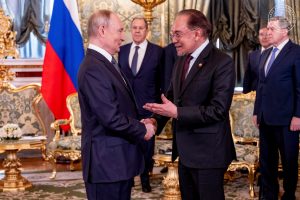Malaysian Prime Minister Anwar Ibrahim will today wind up a state visit to Russia that has been overshadowed by the downing of Malaysia Airlines Flight MH17 in 2014.
On Monday, a day before Anwar’s departure for Moscow, a U.N. aviation body blamed Russia for the disaster. The aircraft was shot down over eastern Ukraine in July 2014, during fighting between pro-Russian separatists and Ukrainian forces, killing all 283 passengers and 15 crew members aboard.
Anwar said that he raised the issue of Flight MH17 with Russian President Vladimir Putin, when the two leaders met for bilateral talks in Moscow on Wednesday.
“For sure, as a representative of the Malaysian people, particularly the families of the victims, I took the opportunity to raise the issue with President Vladimir Putin during our bilateral discussions,” Anwar said at a joint press conference with Putin, according to the state news agency Bernama.
Besides this, Anwar said that the two leaders held wide-ranging discussions on bilateral cooperation and regional and global political developments. Anwar also said that he invited the Russian leader to attend the East Asia Summit, which will be hosted by Malaysia later this year.
“I can assure you that your presence in Malaysia would be a major breakthrough, not only in our bilateral relationship, but also for the region, because I believe many people in this part of the world have great respect for, and high expectations of your leadership,” Anwar said.
Earlier, Anwar met with Russian Prime Minister Mikhail Mishustin, with whom he discussed ways of “strengthening bilateral relations and exploring new areas of cooperation across various strategic sectors, including cultural and scientific exchanges,” Bernama reported.
However, Anwar’s four-day visit to Russia, his second since taking office in late 2022, was complicated by the release of the report by the International Civil Aviation Organisation (ICAO), which concluded that Russia was responsible for the downing of MH17.
Anwar said that in his meeting with Putin, the Russian leader expressed condolences to the families of those killed, which included 196 Dutch citizens, 43 Malaysians, and 38 Australians. Putin then called for a “thorough and comprehensive investigation that was free from political influence,” Anwar said. The Kremlin has rejected the ICAO investigation as “biased.”
Anwar said in a Facebook post late on Wednesday that he would continue to press for accountability over the disaster. “Malaysia remains resolute in ensuring accountability and a just resolution for the victims and their families who continue to bear the weight of this tragedy,” he wrote, as per Reuters.
Exactly what this might mean in practice is unclear; nor is it clear why Anwar would choose to travel to Russia at exactly this juncture. But it is clear that the issue of Flight MH17 has revealed some tensions in Anwar’s foreign policy in general, and his desire for good relations with Russia in particular.
Earlier this week, I argued that Anwar’s warm feelings toward Russia, which he has previously described as a “key partner” of Malaysia, and his praise for Putin’s “vision and leadership,” stem from his desire to maintained balanced relations with contending geopolitical blocs and his deep skepticism about the current U.S.-led international order, enhanced by Israel’s brutal assaults on the Palestinians of Gaza.
In his meeting with Putin, Bernama reported, Anwar mentioned Malaysia’s commitment to “rules-based multilateralism” and said that “we do not accept unilateral actions by any country, as they would disrupt these arrangements and the peace and security of our region and the world.”
The downing of flight MH17, which killed a significant number of Malaysians, would seem to be exactly the kind of “unilateral” action that Anwar has in mind. And the fact that Russia’s responsibility for the disaster has been confirmed by the ICAO, an institution of “rules-based multilateralism” if ever there was one, would seem to require a stronger stand by the Malaysian leader, for domestic political reasons if nothing else.
Anwar has already been called out by local critics for taking a “soft approach” to the matter of Flight MH17. “It’s deeply unfortunate that the Malaysian government has yet to take a firm stand to demand accountability and compensation from the Russian government,” P Ramasamy, the chair of the United for the Rights of Malaysians Party, said in a statement. “Anwar’s failure to do so, despite overwhelming evidence and international consensus, reflects a lack of moral courage and leadership.”
Anwar’s bid for closer relations with Russia, a part of what he views as a salutary shift in the global distribution of power, has already required him to delicately step around the issue of Russia’s aggression toward Ukraine. As things stand, it seems like the same will be true of Flight MH17.
































